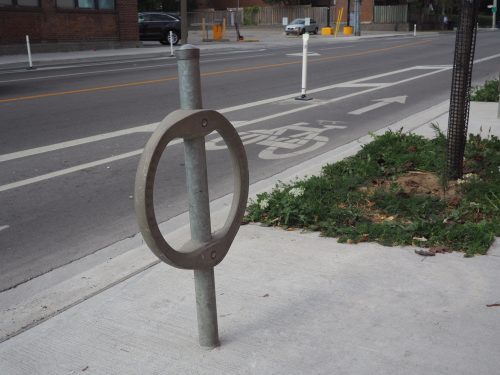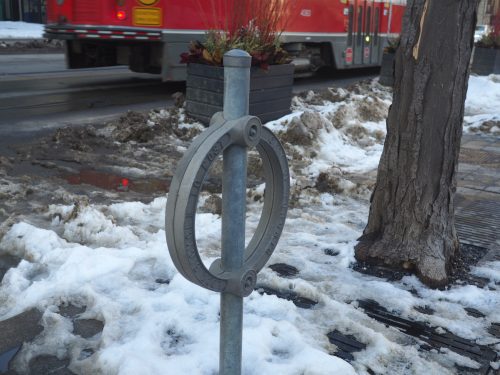
 Toronto’s bike ring has an iconic presence on the City’s streets and a history that dates back to the 1980s.
Toronto’s bike ring has an iconic presence on the City’s streets and a history that dates back to the 1980s.
Prior to the bike ring, the City’s coin-operated parking meters became the unofficial on-street bicycle parking facilities. During this time, discussions to potentially add a ring around parking meters to accommodate bicycles took place, but didn’t move forward. This resulted in the need to accommodate bicycle parking in a different, stand-alone way.
 The concept for a stand-alone bicycle parking ring was proposed by the City Cycling Committee and developed by the City’s urban designers. The design was driven by a dissatisfaction with bike rack designs available in the 1980s and influenced by the earlier ideas to include rings on parking meters for bicycle parking. The original design included an aluminum cast ring bolted onto a steel pipe. initials of the City’s urban designers David Dennis and Eric Pederson were included in the early design. Twenty-five bike rings were rolled out as part of the initial program in 1984.
The concept for a stand-alone bicycle parking ring was proposed by the City Cycling Committee and developed by the City’s urban designers. The design was driven by a dissatisfaction with bike rack designs available in the 1980s and influenced by the earlier ideas to include rings on parking meters for bicycle parking. The original design included an aluminum cast ring bolted onto a steel pipe. initials of the City’s urban designers David Dennis and Eric Pederson were included in the early design. Twenty-five bike rings were rolled out as part of the initial program in 1984.
In 1999, the City began replacing curbside coin operated parking meters with pay-and-display machines. Concerns were raised that the loss of the coin-operated parking meters were leading to a major loss in bicycle parking. Rather than lose bicycle parking, the City began converting decommissioned parking meter poles to post and rings. This resulted in a surge of installations, totaling approximately 3,000 installations per year over a 3-year period.
 In 2006, a series of bike thefts occurred on bike rings, leading to a strengthening of the design by adding a second ring. The City continued to seek design improvements. City bike rings total approximately 13,700.
In 2006, a series of bike thefts occurred on bike rings, leading to a strengthening of the design by adding a second ring. The City continued to seek design improvements. City bike rings total approximately 13,700.
In 2007, the City entered into an agreement with Astral Media for a Street Furniture Program that involved the design, installation and maintenance of on-street furniture by Astral Media. As part of this contract, Astral Media designed a new version of the bike ring. However, a desire the improve the original bike ring design and operate the bike ring program separately from the street furniture program led to the decision to continue to refine the City’s original bike ring design. In the meantime, bike rings already produced as part of the Astral Street Furniture Agreement were installed in limited areas.
Upon hearing of the issues with the single ring design, now independent designer David Dennis contacted the City, determined to improve the original ring and post design he had helped develop. Through a design process, a revised, sleeved ring on the post design was developed. This would prove much more durable than the single bolted ring design, while still maintaining the simplicity and slim profile of the original bike ring. By 2008, the City began to install the improved bike rings.
Today, City staff work closely with the public, encouraging suggestions for new locations and installing hundreds of new bike rings annually. With City bike rings totaling approximately 17,500 at the end of 2016.
Toronto’s bicycle parking post and ring design presents a simple and cost efficient solution to providing safe bike parking on narrow and often confined sidewalks. The design has welcomed attention many other places and manufacturers, including cities in the Unites States and Europe. In Toronto, the TTC and University of Toronto installed their own post and rings for the bicycle parking that can be found on campus and around subway stations today. In addition, specialty bike rings can be found on city streets, including those along Queens Park outside the Royal Ontario Museum (ROM). Designed for the ROM, the bike stands were installed on City property though an encroachment permit.
City pilots 25 bike rings, followed by a period of installations of approximately 500 bike rings per year.
Amalgamation and replacement of parking meters with pay-and-display units results in mass installation of bike rings in select parking meter locations. Bike ring installations increase to up to 3,000 per year.
City bike rings total approximately 6,800
City bike rings total approximately 13,700
City bike rings total approximately 17,500
To suggest a bike ring location, please contact streetfurniture@toronto.ca. To request maintenance or repair of an existing bike ring call 311 or email 311@toronto.ca.